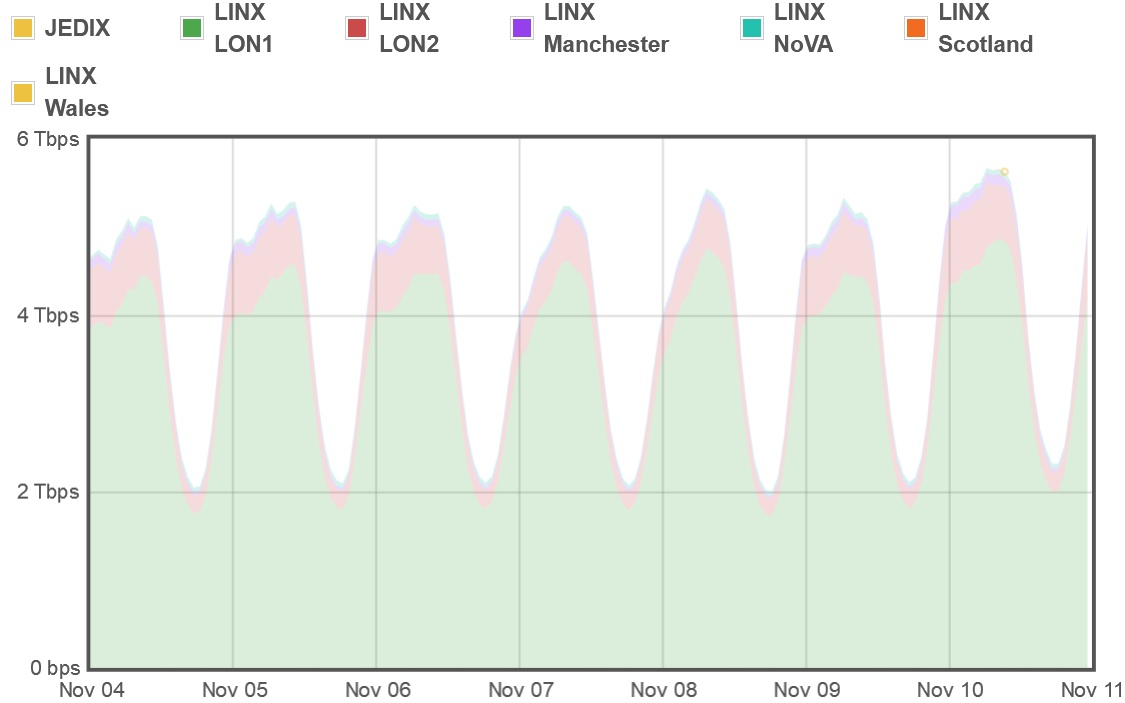Record Internet Traffic Surge Seen by UK ISPs on Tuesday UPDATE4

A combination of the COVID-19 lockdown in various parts of the UK, plus the release of another Call of Duty Warzone game update, a Microsoft Windows patch and the Xbox Series X console release (inc. related day 1 patches) seems to have pushed internet traffic at some broadband ISPs to a new record.
At this stage we’re still gathering data, although TalkTalk have already reported that they saw a “record data traffic peak at 9:20pm last night“, which is said to have hit 6.85Tbps (Terabits per second) and that compares with last Thursday’s general high of 6.46Tbps.
By comparison BT alone said traffic over their network peaked at 18Tbps. Meanwhile you can also see the impact of Tuesday’s traffic on switches at the London Internet Exchange (LINX), which hit a new maximum peak across the entire LINX network of 5.71Tbps.
Advertisement

As usual, we should point out that demand for data is constantly rising and so new peaks of usage are being set all the time by every ISP (usage typically grows by 30%+ each year), but every once in a while, it’s interesting to look at specific events like this one.
Most ISPs also employ Content Delivery Networks (CDN) to help manage the load from such events, which caches common content closer to end-users (i.e. improves performance without network strain) and lowers their impact on external links.
UPDATE 1:02pm
Advertisement
Broadband ISP Zen Internet also saw an 11.57% increase in traffic last night above its highest peak in October 2020 (peaking at 8pm). On top of that Zen’s network is seeing 72% more traffic this month than it saw in November 2019.
UPDATE 4:45pm
Openreach reports that they saw more than 174 Petabytes (PB) of data being consumed yesterday, which was high but not a new record.
An Openreach spokesperson told ISPreview.co.uk:
“On Tuesday, we saw an increase in traffic on our network, with more than 174 Petabytes of data being consumed. This compares to the previous busiest days of Wednesday 5th August (193PB) and Thursday 9th July (192PB) 2020.
Tuesday saw the anticipated release of the new Xbox Series X, which we’ve been told needed a large patch during the installation stage, while at the same time iPhone users saw a forced IOS software update. We expect to see another surge in traffic next Friday with the release of the PS5.
We’ve had no major outages during this whole period and we’re always monitoring our network to identify any areas where we might need to add extra capacity.”
UPDATE 12th Nov 2020 – 7:07am
Advertisement
Sky Broadband informs that traffic on the same day reached 16.6Tbps at its highest peak.
A Sky spokesperson told ISPreview.co.uk:
“Sky Broadband observed a traffic surge yesterday which reached 16.6Tbps at its highest peak; the networked coped well with this. We believe it was driven by multiple events including Xbox console releases, Call of Duty’s patch release and the release of Assassin’s Creed, along with our BAU traffic.”
UPDATE 12th Nov 2020 – 2:35pm
Finally, Virgin Media has just informed us that Tuesday 10th November was their “busiest day on record for internet traffic” across its network, running at 30% higher than their October 2020 average. In total, 108 Petabytes of data was consumed on Tuesday – an average of more than 20GB per customer. Virgin Media’s previous busiest ever day of network traffic was 11th June, which coincided with the launch of Call of Duty: Modern Warfare Season 4.
Jeanie York, VM’s Chief Technology and Information Officer, said:
“Keeping the country connected remains a top priority for Virgin Media. We’ve seen previous network traffic records smashed this year as a result of Covid-19 with our customers spending more time at home working, streaming, gaming, scrolling and virtually staying in touch with friends and family. We remain focused on supporting our customers with fast, robust connectivity at a time when these connections have never been more important to our lives.”
The operator anticipates another busy week of network traffic ahead, with Amazon Prime Video streaming the Autumn Nations Cup 2020 this weekend as well as the launch of the PlayStation 5 next Thursday.
Mark is a professional technology writer, IT consultant and computer engineer from Dorset (England), he also founded ISPreview in 1999 and enjoys analysing the latest telecoms and broadband developments. Find me on X (Twitter), Mastodon, Facebook, BlueSky, Threads.net and Linkedin.
« EE UK Launch First Own Brand 5G WiFi Mobile Broadband Router
Rural Gigabit UK ISP Gigaclear Bundles Sky TV for First Time »






















































Also season 2 of Destiny 2 was put yesterday as I understand, so plenty will have been downloading that along with everything else.
Also apple one more thing and everyone is on interner in evenings!!!
30% may be an underestimate with the amount of FTTP going in where even 80/20 actually means 80/20 rather than 20/5!!
That of itself will push peak consumption up never mind the higher tiers of FTTP that are selling well thanks to WFH.
Last night (Tues 10/11/2020) around 6pm-8pm UK time there was also an Apple Launch event streamed online for a new range of MacBooks which use their own in-house designed silicon. They are no longer using Intel CPU’s. This event may have added to the evenings traffic spike?
Another way of viewing this is it just goes to show how underpowered UK Internet infrastructure is.
67m people in the UK and 27.8m households. If we were to have a gigabit reality, we should see that LINX has capacity of 27.8 terabits – the fact it’s only recording 6.46 tbps is just 23% of what it needs to be.
You have to remember that the majority of people are not 24/7 thrashing their connection to 100% utilisation. In reality most broadband connections sit there doing very little for much of the day, only occasionally jumping to suck from the data pipe for any real length of time, with modern CDN/Caching helping to further reduce that load.
The exception is that 5-10% of people who make heavy use of their connection for protracted periods of time. So it’s not as simple as just expecting a huge data surge from everybody having access to a gigabit.
No, not at all. Most Internet connections sit idle for most of the time and this idle time increases with faster connections. There’s no use case where an individual constantly maxes out their connection through normal usage. How many 4K streams can you watch at once?
Most ISPs and transit providers deliberately over provide core capacity by a factor of four or five to allow for transient peaks and the failure of individual links, but as soon as a path reaches more than about 40% utilisation it will be increased in size.
What Mark says, but Julian your maths is out by a factor of 1000.
27.8 million homes x 1 Gbps = 27,800 Tbps
Or 27.8 x 10^6 x 1 x 10^9 = 27.8 x 10^15 bps
LINX is only for public peering, which ignores the collossal amounts of traffic from private peerings.
Larger ISPs (say, Sky, Talktalk, Zen) may well decide to directly connect with some/any/all of the larger content providers (Google, Amazon, Facebook, Microsoft, Akamai, Limelight, BBC, etc etc) over a private, dedicated link.
This traffic won’t be seen on any of the LINX graphs. It’ll be a private link, sized appropriately to handle the traffic between those two networks.
This would also explain why sometimes some sites might feel slow, whereas others will be fast. Let’s pretend that BT have a private link to Google, and it’s under heavy load, but their route to the CDN that’s streaming the Apple “one more thing” announcement is not congested. You might watch Apple’s video with no problem, but then Youtube might be buffering or refusing to select a higher quality. A speedtest returns good news too (since it, too, might choose a different – quieter – route).